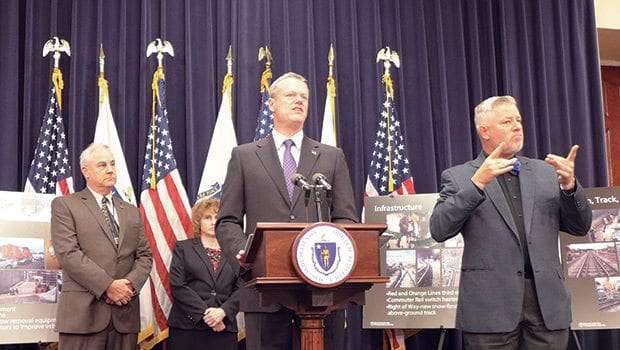Governor introduces MBTA winter resiliency plan
Includes $87.2 million to make sure we’re ready next time

Last week, Gov. Charlie Baker released his latest in the ongoing conversation about how to avoid another winter on the MBTA like this past snowy season.
Dubbed the self-explanatory MBTA Winter Resiliency Plan, the plan would invest $87.2 million over the next five years in snow removal equipment, infrastructure upgrades, and operations to improve service reliability during harsh weather.
At a press conference last Thursday with the Governor and Interim MBTA General Manager Frank DePaola, Secretary of Transportation Stephanie Pollack placed the plan in contemporary terms.
“As any Game of Thrones fan knows, ‘Winter is coming,’” she said. “This has been the mantra at the MBTA.”
The governor added that the investment in winter equipment was only part of a much bigger solution to the state’s public transit system.
“This is obviously not a cure-all,” he said. “There remains significant work to be done.”
As he touted the efforts on winter-related improvements, Baker also called for legislative action on his MBTA reform bill, filed in April, known as “An Act for a Reliable, Sustainable MBTA.”
That bill would implement the much-discussed Fiscal Management and Control Board to oversee the agency for three years, introduce reporting and auditing requirements, and lift the so-called Pacheco law as it applies to the MBTA.
The Pacheco law is a 1993 law that requires state agencies to engage in a cost-comparison analysis before contracting work performed by state workers to private agencies. Critics of the law have long viewed it as a bow to political pressure from unions, while supporters maintain it is a commonsense cost-control method.
Fast track
At last week’s press conference, Baker said he hoped the FCMB would be in place by the end of the summer.
The governor’s winter preparedness plan would be funded through a mix of sources. According to a statement issued from his office, that includes $62 million in federal formula funds for capital investments, $10 million in non-federal, MBTA capital funds, and $11.7 million in operating funds.
Transportation experts who spoke with the Banner viewed the Winter Resiliency Plan as a positive step.
“I think that it is very positive that the MBTA is working now to make sure that they will be better prepared for future winters, and that the governor is recognizing that it will take extra funding to deal with this properly,” said Fred Salvucci, a senior lecturer in civil engineering at MIT and former Secretary of Transportation under Governor Michael Dukakis.
He added a note about the MBTA’s long-term future.
“I believe that improving service all year long will also take added funding, and hope that this snow readiness action is a good sign of willingness to deal with the financial necessity for the state to put more money into the T if we want better service.”
Better resilience
Marc Draisen, executive director of the Metropolitan Area Planning Council, sounded a similar note.
“The Governor’s winter resiliency plan is an important first step towards ensuring that we are better prepared when future winter storms hit our region. We are grateful that the Governor is looking ahead, especially given the impact of this winter’s historic snowfall,” he said in an email statement to the Banner.
He, too, nodded to long-term issues.
“At the same time, we need to do more to make the MBTA run more efficiently and to meet growing and anticipated demand and we need to ensure that it has enough resources to do so.”
The governor’s plan was presented to the MassDOT board this week for approval, although not before the Banner’s press deadline.






